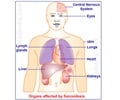Extremely premature infants suffer abnormal lung development leading to bronchopulmonary dysplasia, a chronic lung disease that can cause long-term breathing problems
Some 20 to 40 percent of extremely premature infants suffer abnormal lung development leading to bronchopulmonary dysplasia, a chronic lung disease that can cause long-term breathing problems. Little is known about how to predict whether a premature infant will develop BPD in the weeks after birth, much less how to prevent or treat it. Now, gene-chip studies of these tiny babies' umbilical cords provide unexpected, much-needed leads into predicting and treating this debilitating condition.
The study - one of the first uses of gene-chip (microarray) analysis to study diseases of premature newborns -- was led by Isaac Kohane, MD, PhD, director of the Children's Hospital Informatics Program (CHIP), based at Children's Hospital Boston and affiliated with Harvard Medical School and the Harvard-MIT Division of Health Sciences and Technology, and Jennifer Cohen, MD, a neonatology fellow at Children's. Findings will appear online in Genome Biology (http://genomebiology.com) on October 4.Kohane, Cohen and colleagues obtained samples from the umbilical cords of 54 surviving infants born at less than 28 weeks' gestation and analyzed the activity of all 30,000-odd genes for each infant. The specimens were collected as part of the Extremely Low Gestational Age Newborn (ELGAN) study (www.elganstudy.org/), a national study of infants born more than three months early. Twenty of the 54 infants developed BPD after birth; the other 34 did not.
"In the infants who went on to have BPD, we were surprised and intrigued to find a difference in a biochemical pathway that's also disrupted in adult chronic obstructive pulmonary disease (COPD)," says Kohane, the study's senior author.
Source-Eurekalert
SPH/C









